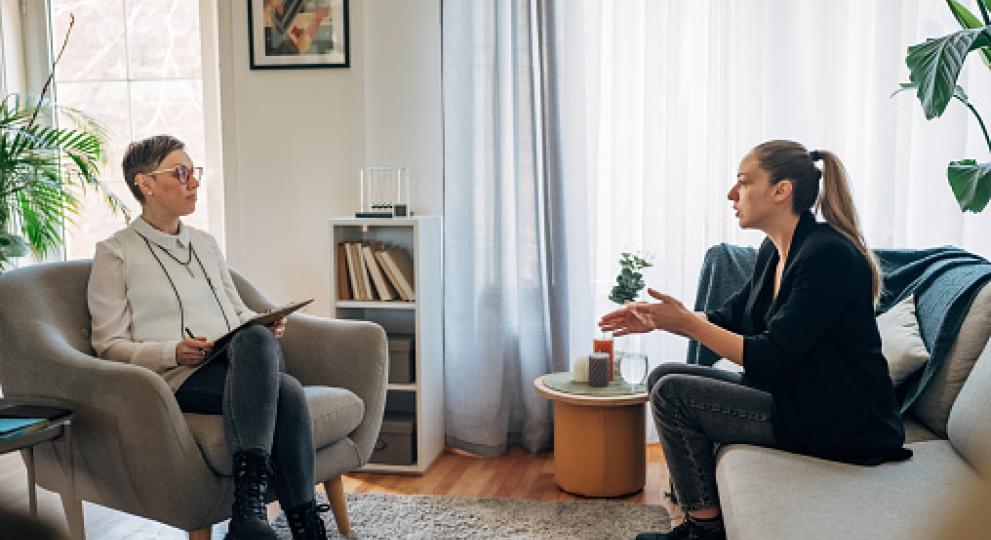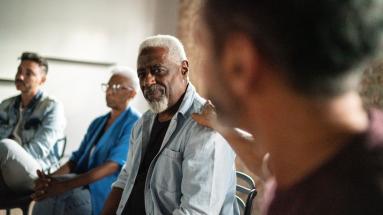How Therapy Can Help You Cope with Cancer
How Therapy Can Help You Cope with Cancer

After a cancer diagnosis, many people may focus on the physical treatment plan, such as chemotherapy or surgery. But sometimes they overlook the importance that psychological therapy can play to treat the emotional toll of cancer.
Research shows that people living with cancer who use supportive services, such as psychological therapy, report better quality of life.[1] Getting support through therapy may also help you process and cope with your feelings, from mental health challenges like anxiety and loneliness to practical concerns like financial worries about the cost of treatment.
If you feel that psychological therapy isn’t right for you, you might be surprised to learn that there are many different types of therapy. Your care team can help you find therapists in your area and share local and virtual resources for people living with cancer.
Types of psychological therapy include:
Individual talk therapy or behavioral therapy: One-on-one sessions where you talk through your thoughts and feelings and receive counseling.
Cognitive behavioral therapy (CBT): A type of therapy that helps patients identify, challenge, and change negative or distorted thought patterns and replace them with more constructive, rational, and balanced perspectives.
Acceptance and commitment therapy (ACT): A form of psychotherapy that encourages people to accept and embrace their thoughts and feelings, rather than fighting or feeling controlled by them. ACT emphasizes mindfulness and living in the present moment, helping patients detach from unhelpful thought patterns and focus on what truly matters.
Couples or family therapy: Another type of talk therapy where you attend with your partner or family to discuss your thoughts and feelings, including how cancer affects everyone in the household.
Group therapy: A form of psychotherapy/psychological therapy where people with similar diagnoses meet in a supportive group setting, facilitated by a therapist.
Support groups: Unlike group therapy, support groups are not always led by a mental health professional. These groups often focus on sharing experiences rather than specific mental health tools or advice.
Art therapy: A type of therapy focused on using art materials to express difficult feelings and emotions. It may be helpful for people who feel uncomfortable with talk therapy. Artistic skills are not required!
Mindfulness-Based Stress Reduction (MBSR): This approach incorporates mindfulness meditation and gentle yoga to reduce stress and improve overall well-being.
Music therapy: This type of therapy may involve improvisation, drumming, song writing, or music meditation. A review of research involving more than 5,000 adults with cancer found that music therapy may help with anxiety, depression, hope, pain and fatigue.
If you’re interested in therapy, consider these Microsteps to get started. As always, speak with your care team for the guidance and recommendations that are best for you.
Writing down your feelings in a journal.
Documenting your thoughts, behaviors, and patterns may help guide you toward what type of therapy could be best for you. You can look back at your journal entries to guide conversations with your care team or therapist.
Thinking about one moment from your cancer journey that stands out to you.
Reflecting on a key experience, such as the moment of your diagnosis or sharing your health news with a specific loved one, can be a first step in exploring your emotions, setting you up for meaningful conversations with a therapist.
Setting up a consultation with a mental health professional you are interested in.
Many professionals offer introductory consultations so you can see if they are a good fit before you book sessions.
Finding a cancer role model whose therapy experience inspires you.
Look out for interviews, memoirs, podcasts, or TED talks from an individual who has shared about their experience with therapy while living with cancer. Knowing that other people seek support may be a source of comfort as you continue on your own journey.
Developed with Thrive Global













